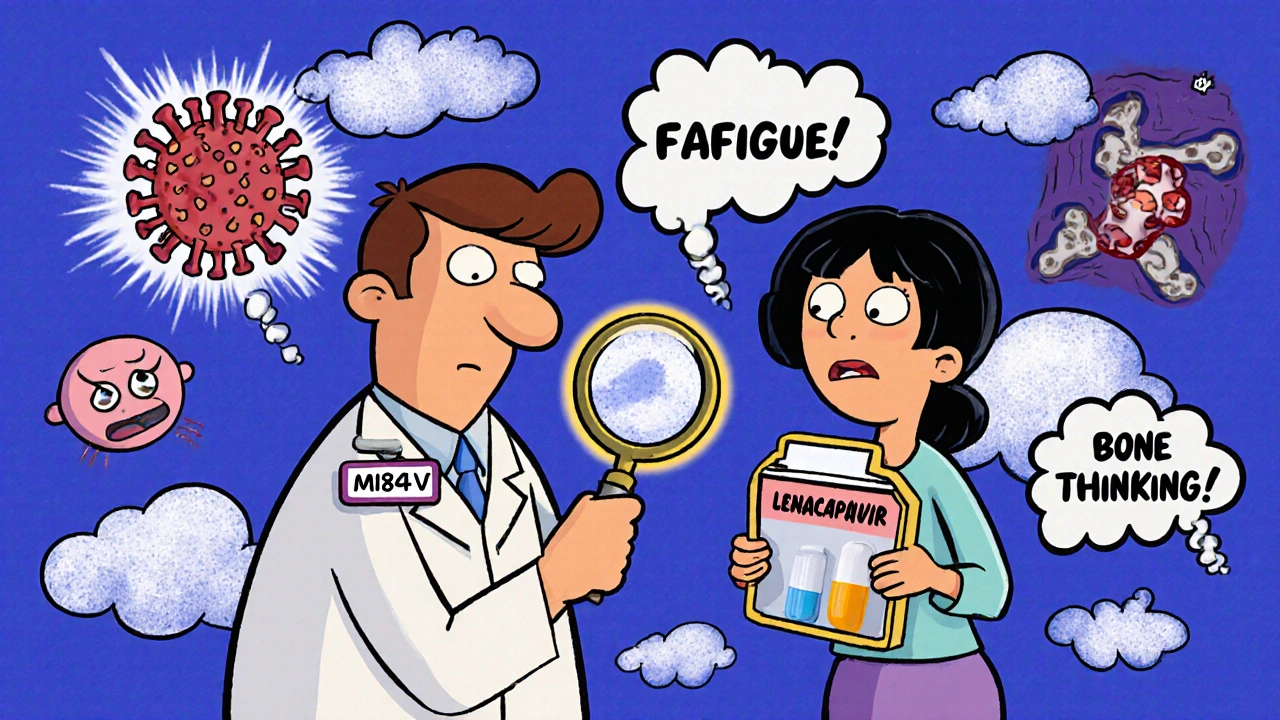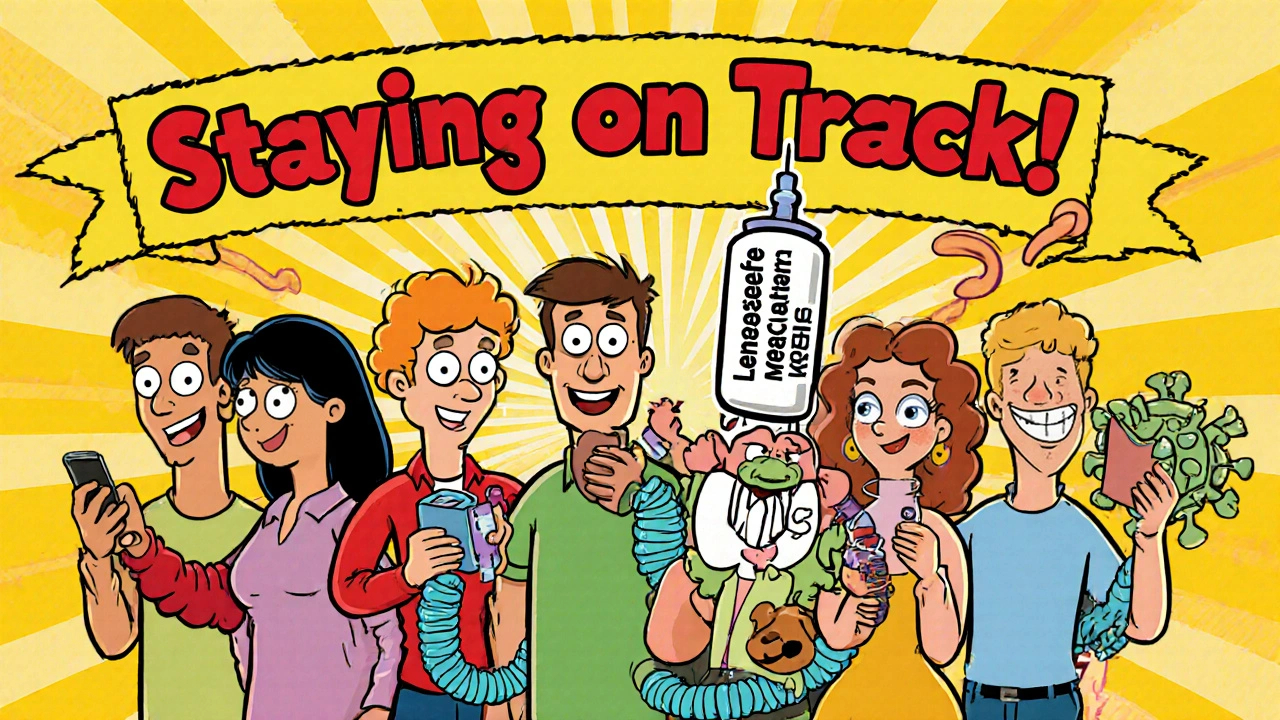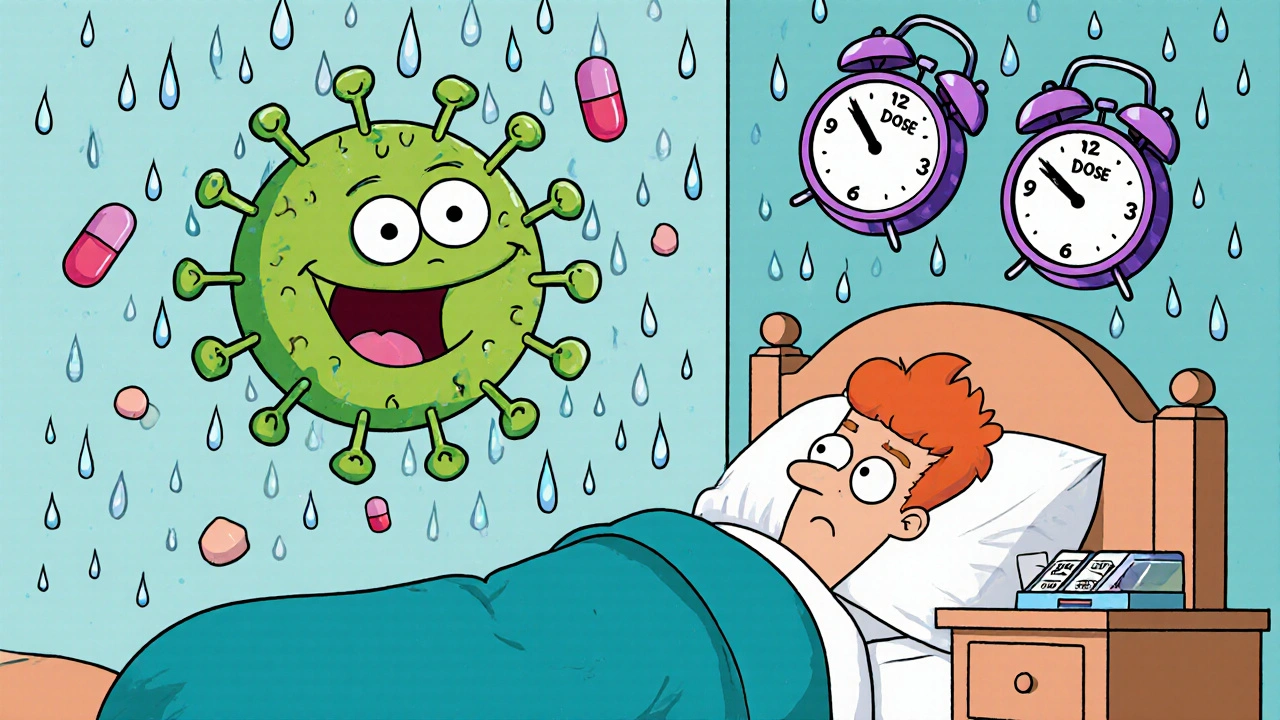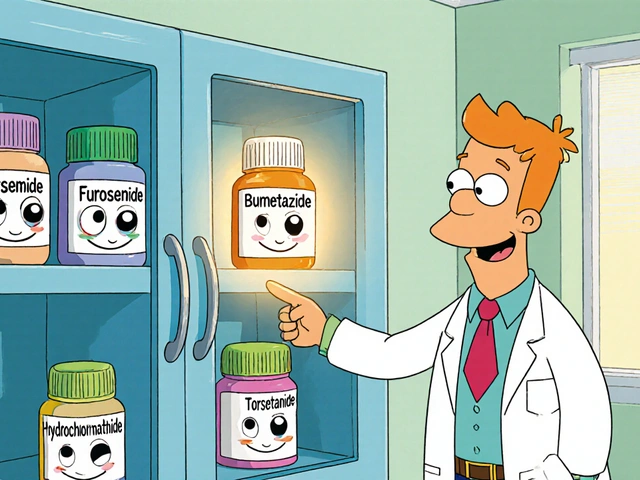Why Antivirals Stop Working
Antivirals don’t always work forever. That’s not because the drug is broken-it’s because the virus changes. Viruses like HIV, hepatitis B, herpes, and even flu mutate quickly. Every time they copy themselves, tiny errors creep in. Most of these changes don’t matter. But sometimes, one of them lets the virus ignore the drug. That’s resistance.
It doesn’t happen overnight. It builds over time, especially if you miss doses or stop treatment early. Think of it like this: if you take your antiviral every day, the virus can’t get a foothold. But if you skip a few doses, the virus gets a chance to breathe, multiply, and evolve. That’s when resistant strains take over.
Some drugs are more prone to this than others. Lamivudine, used for hepatitis B, has a low genetic barrier-meaning it takes just one mutation for resistance to show up. Studies show up to 70% of people on long-term lamivudine develop resistance within five years. Compare that to adefovir, which needs several mutations before it fails-only 29% develop resistance in the same timeframe. Newer drugs like lenacapavir, approved in 2023, are designed with a high genetic barrier. In trials, 96% of patients showed no resistance after 72 weeks.
Resistance isn’t random. It follows patterns. For HIV, the M184V mutation makes drugs like emtricitabine and lamivudine useless. For herpes, over 90% of acyclovir resistance comes from mutations in the thymidine kinase gene. For CMV, resistance usually shows up in the viral DNA polymerase or kinase enzymes. Doctors now test for these mutations before starting treatment, especially for patients with weakened immune systems or those who’ve failed therapy before.
What Side Effects You Might Actually Feel
Antivirals aren’t magic pills with no downsides. Most people tolerate them well, but side effects are real-and they’re one of the biggest reasons people stop taking their meds.
For HIV treatment, nausea, headaches, and fatigue are common in the first few weeks. About 25-30% of patients report side effects severe enough to consider quitting. Modern single-pill regimens have cut this down dramatically. Still, some drugs cause long-term issues: tenofovir can affect kidney function; efavirenz may cause sleep problems or mood changes. These aren’t universal, but they happen often enough that your doctor should monitor you.
Hepatitis C drugs, especially the newer direct-acting antivirals (DAAs), are much better tolerated. A 2023 survey on HepatitisC.net showed 87% of users were satisfied. But 23% still reported fatigue, and 18% had headaches. These usually fade after treatment ends. For herpes suppressive therapy, valacyclovir (once daily) is generally well-tolerated, with nausea or dizziness being rare. Older acyclovir, taken three times a day, caused more stomach upset simply because of the frequency.
Some side effects are sneaky. You might not notice them until they pile up. Weight gain? That’s linked to some newer HIV drugs. Bone thinning? Seen with long-term tenofovir use. Liver enzymes going up? Could be a sign your body is reacting to the meds. That’s why regular blood tests matter-even if you feel fine.
And yes, some side effects are psychological. The stigma around chronic viral infections can make people feel like they’re constantly being watched. Taking pills every day reminds you of your diagnosis. That emotional weight can make adherence harder than the physical side effects.
How to Actually Remember to Take Your Meds
Adherence isn’t about willpower. It’s about systems.
Here’s what works, based on real patient data:
- Use a pill organizer with days of the week. Studies show 63% of people who stick to their meds use one.
- Set phone alarms. Not just one-set two. One in the morning, one in the evening. 57% of adherent patients use reminders.
- Link your dose to a daily habit. Take your pill after brushing your teeth, or with your morning coffee. Habit stacking makes it automatic.
- Keep extra pills in your bag, car, or work drawer. Travel, work trips, or last-minute changes don’t have to derail you.
- Use a medication app. Apps like Medisafe or MyTherapy track doses and send alerts. Some even let you share progress with a loved one.
For people on HIV treatment, single-tablet regimens changed everything. Ten years ago, some patients had to take 10-15 pills a day, at different times. Now, most take one pill once a day. That reduced the time to stable adherence from 8 weeks to just 2 weeks.
For hepatitis B or herpes, once-daily dosing has boosted adherence from 42% with older regimens to 68% with valacyclovir or tenofovir. Simpler = better. If your doctor still prescribes a drug that needs three doses a day, ask if there’s a newer option.
Pharmacists are underrated allies. Many pharmacies offer free adherence counseling. A 2025 study found patients who met with a pharmacist for adherence support had 28% fewer cases of resistance. They can explain side effects, suggest alternatives, and help you navigate insurance hurdles.

What Happens When You Skip Doses
Missing one dose isn’t a disaster. Missing several? That’s when things get risky.
When you skip a dose, drug levels in your blood drop. The virus starts replicating again. Every time it copies, there’s a chance a mutation slips in. If that mutation resists the drug, it survives. Over time, it becomes the dominant strain. That’s how resistance builds.
One patient on Reddit, who goes by ViralVictor, missed doses during a business trip. His viral load spiked. When he got tested, he had the M184V mutation. His doctor switched him to a dolutegravir-based regimen, which still worked. But he had to start over with a new drug combo. That’s not rare.
Studies from the HIV Medicine Association show 32% of patients missed at least one dose in the past month. The top reasons? Complex schedules (47%), side effects (31%), and travel (19%).
And here’s the scary part: resistance doesn’t just affect you. If you’re on HIV treatment and develop resistance, you can pass a resistant strain to someone else. That’s called transmitted resistance. It’s happening more often, especially in areas with low testing rates.
Drug holidays-taking breaks from meds-are dangerous. Even a week off can trigger resistance. That’s why doctors now warn against them, even if you feel fine.
What’s New in Antiviral Treatment
Things have changed a lot since the 1990s.
Back then, HIV treatment meant taking 20 pills a day, with brutal side effects. Today, most people take one pill. Hepatitis C used to require 48 weeks of interferon injections, with flu-like symptoms and depression. Now, it’s 8-12 weeks of oral pills, with a 99% cure rate.
Lenacapavir, approved in 2023, is a game-changer. It’s a capsid inhibitor-meaning it blocks the virus’s outer shell. It’s given as a shot every six months. In trials, no resistance developed in 96% of patients. That’s unheard of.
Resistance testing is now recommended before starting treatment for most chronic viral infections. That’s a shift from just testing after failure. It means doctors can pick the right drug from day one.
CRISPR gene editing is being tested in early trials for HIV. Early results show it can reduce viral reservoirs by 60% without triggering resistance. It’s not ready yet, but it shows where the field is headed: not just suppressing the virus, but eliminating it.
Meanwhile, global access remains uneven. While 76% of diagnosed HIV patients worldwide get treatment, only 12% of eligible hepatitis B patients do. Why? Cost, lack of testing, and fear of long-term resistance. We have the tools. We just need to use them.

When to Talk to Your Doctor
You don’t have to suffer in silence. If you’re having trouble with side effects, skipping doses, or feeling overwhelmed, talk to your doctor. But don’t wait until your next appointment.
Call if:
- You’ve missed more than two doses in a week.
- You’re having new or worsening side effects.
- You’re planning to travel or change your schedule.
- You’re thinking about stopping the meds.
Your doctor can switch you to a better-tolerated drug, simplify your regimen, or connect you with support services. There’s no shame in asking for help. The goal isn’t perfection-it’s staying alive and healthy.
And if you’re worried about resistance, ask for a resistance test. It’s quick, cheap, and tells you exactly what’s going on. If your virus has changed, your treatment can change too.
Bottom Line
Antivirals save lives. But they only work if you take them as directed. Resistance isn’t inevitable-it’s preventable. Side effects can be managed. Adherence is a habit, not a test of character.
Use tools. Talk to your team. Don’t wait for a crisis to act. Your virus doesn’t care if you’re busy, tired, or scared. It only cares if you take your pill.
Stay on track. Your future self will thank you.







Dan Rua
November 26, 2025 AT 02:55Mqondisi Gumede
November 26, 2025 AT 12:30Douglas Fisher
November 26, 2025 AT 16:04Bethany Buckley
November 27, 2025 AT 18:56Stephanie Deschenes
November 28, 2025 AT 03:05Cynthia Boen
November 28, 2025 AT 10:32Amanda Meyer
November 29, 2025 AT 02:57Jesús Vásquez pino
November 30, 2025 AT 16:44hannah mitchell
December 1, 2025 AT 02:18vikas kumar
December 1, 2025 AT 22:09